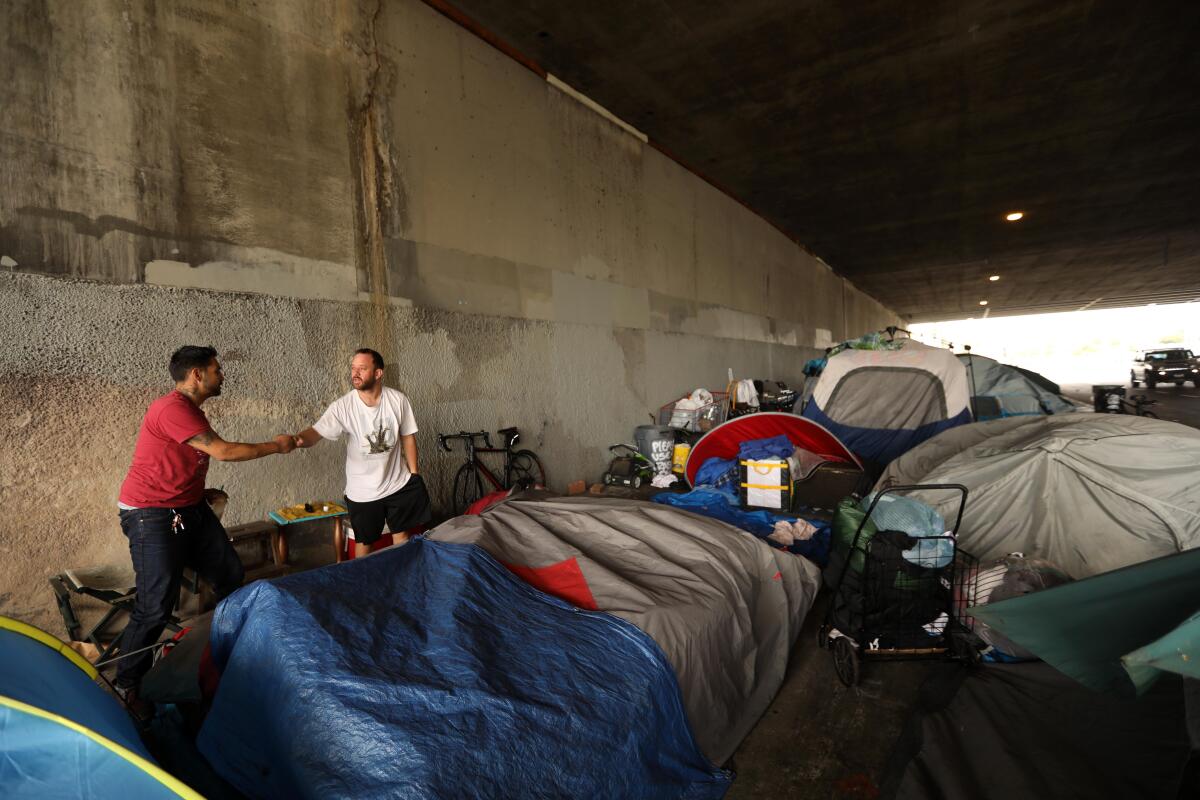Supreme Court decision on homeless case is a blow to cities wanting more policing powers

- Share via
For communities across the West hoping to gain some legal leeway to deal differently with homeless people sleeping on their streets, the U.S. Supreme Court on Monday dealt them a setback that, at least for now, maintains the status quo.
The high court declined to hear a landmark case on homelessness, letting stand a ruling that amounts to a broad curb on police powers in nine Western states, including California, to stop people from sleeping on public property if no other shelter is available.
Dozens of other local governments, including the city and county of Los Angeles, had urged the court to hear a challenge to Martin vs. City of Boise, in part to clarify how best to comply with it. But the justices, without comment or a dissent, said that they would not.
Here’s what that means for Los Angeles and the rest of California.
Q: What is Martin vs. City of Boise?
A: It’s a landmark ruling by the U.S. 9th Circuit Court of Appeals in 2018. It arose from a lawsuit involving about a half dozen homeless people who were cited for camping on public property in Boise, Idaho.
The federal appeals court said it is unconstitutional to punish people for sleeping on the sidewalk when there aren’t enough shelter beds or housing available as an alternative. The court, however, does not explain how to determine how many are enough and over what geographic area — a particular problem in Los Angeles County, which encompasses many cities and tens of thousands of homeless people.
Q: How did this happen?
A: Last year’s ruling in the Boise case essentially turned what was supposed to be a stopgap arrangement in Los Angeles into a sweeping and open-ended curb on police powers.
In 2007, the city of L.A. stopped putting people in jail for sleeping in the streets as part of a court settlement known as the Jones agreement, which halted police enforcement of laws barring encampments in public spaces until the city could build more housing for homeless people.
That settlement came the year after a previous ruling from the 9th Circuit Court that found L.A.’s sweeps of encampments on skid row were cruel and unusual punishment. Then in 2018, the federal appeals court issued a similar ruling in the case out of Boise, setting up the push for a challenge to the U.S. Supreme Court.
Q: Why is this a big deal for Los Angeles?
A: It essentially leaves in place the status quo — meaning L.A. and other cities cannot prevent people from sleeping outdoors on public property when there aren’t enough shelter beds available.
Los Angeles County has nearly 60,000 homeless people, most of them living on the streets in encampments, which pop up faster than city sanitation crews can dismantle them. The city and county, like much of California, where rents have skyrocketed, haven’t been able to build housing or shelters fast enough to keep up with demand.
Q: Are there any other options?
A: Other than dramatically scaling up new shelters and housing, there aren’t many other options under the existing legal framework laid out in the Boise ruling and now solidified by the Supreme Court.
But co-chairs of the governor’s task force on homelessness, L.A. County Supervisor Mark Ridley-Thomas and Sacramento Mayor Darrell Steinberg, are discussing a possible statewide ballot measure that would create a legal “right to shelter” or “right to housing.”
Such a plan, though still vague, would mean requiring cities and counties to provide enough shelter beds for any homeless person who wants to come indoors. It also could force homeless people to accept shelter if offered.
Q: Why does this matter?
A: The vast majority of homeless people in Los Angeles and California live outside, which is increasingly leading to conflict in neighborhoods.
A recent poll conducted for the Los Angeles Times and the Los Angeles Business Council Institute found that a sizable majority of voters countywide think law enforcement should assume a larger role, despite court rulings and settlements limiting such involvement.
The high court’s decision not to hear the Boise case all but ensures these conflicts will continue.
Times staff writers Gale Holland and Benjamin Oreskes contributed to this report.
More to Read
Sign up for Essential California
The most important California stories and recommendations in your inbox every morning.
You may occasionally receive promotional content from the Los Angeles Times.











